英语正式文体与非正式文体的区别
刍议英汉不同文体的语言特点和翻译策略
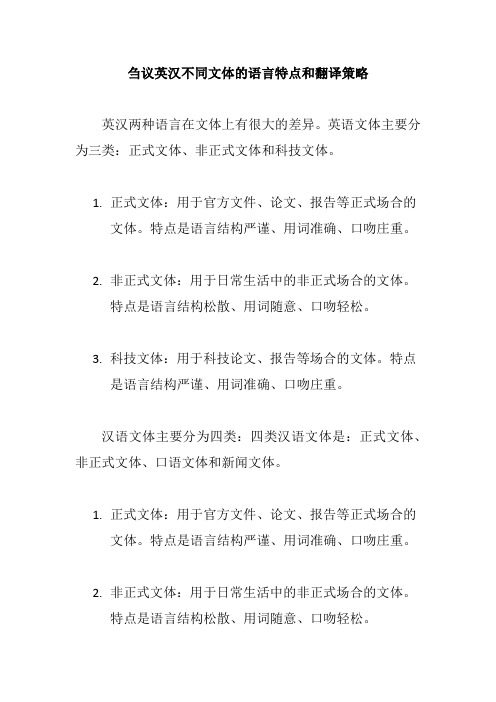
刍议英汉不同文体的语言特点和翻译策略
英汉两种语言在文体上有很大的差异。
英语文体主要分为三类:正式文体、非正式文体和科技文体。
1.正式文体:用于官方文件、论文、报告等正式场合的
文体。
特点是语言结构严谨、用词准确、口吻庄重。
2.非正式文体:用于日常生活中的非正式场合的文体。
特点是语言结构松散、用词随意、口吻轻松。
3.科技文体:用于科技论文、报告等场合的文体。
特点
是语言结构严谨、用词准确、口吻庄重。
汉语文体主要分为四类:四类汉语文体是:正式文体、非正式文体、口语文体和新闻文体。
1.正式文体:用于官方文件、论文、报告等正式场合的
文体。
特点是语言结构严谨、用词准确、口吻庄重。
2.非正式文体:用于日常生活中的非正式场合的文体。
特点是语言结构松散、用词随意、口吻轻松。
3.口语文体:直接记录口语的文体。
特点是语言结构松
散、用词随意、口吻轻松。
4.新闻文体:用于新闻报道的文体。
特点是语言结构严
谨、用词准确、口吻庄重。
在翻译时,要根据原文的文体来选择相应的译文文体。
比如,如果原文是正式文体,那么译文也应该采用正式文体;如果原文是非正式文体,那么译文也应该采用非正式文体。
此外,在翻译时,还要注意保持语言的一致性,即译文中的语言结构、用词、口吻应与原文保持一致。
另外,在翻译时,还要注意把握语境,即要熟悉原文所在的背景、文化、历史等信息,才能更好地理解原文的意思,并进行准确的翻译。
总之,翻译时要注意文体的一致性、语言的一致性和语境的把握,这些都是很重要的翻译策略。
正式英语与非正式英语的主要区别
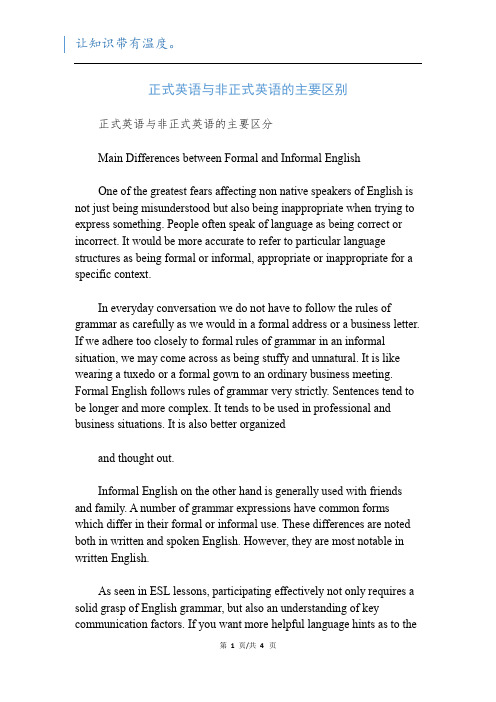
正式英语与非正式英语的主要区别正式英语与非正式英语的主要区分Main Differences between Formal and Informal EnglishOne of the greatest fears affecting non native speakers of English is not just being misunderstood but also being inappropriate when trying to express something. People often speak of language as being correct or incorrect. It would be more accurate to refer to particular language structures as being formal or informal, appropriate or inappropriate for a specific context.In everyday conversation we do not have to follow the rules of grammar as carefully as we would in a formal address or a business letter. If we adhere too closely to formal rules of grammar in an informal situation, we may come across as being stuffy and unnatural. It is like wearing a tuxedo or a formal gown to an ordinary business meeting. Formal English follows rules of grammar very strictly. Sentences tend to be longer and more complex. It tends to be used in professional and business situations. It is also better organizedand thought out.Informal English on the other hand is generally used with friends and family. A number of grammar expressions have common forms which differ in their formal or informal use. These differences are noted both in written and spoken English. However, they are most notable in written English.As seen in ESL lessons, participating effectively not only requires a solid grasp of English grammar, but also an understanding of key communication factors. If you want more helpful language hints as to themost appropriate forms ofEnglish or key points to take into consideration each time you are usingEnglish, read on.Contracted Forms连写Formal - Don’t use contracted forms, use the entire auxiliary verb: They havelived in New York for many years.Informal - Use contracted forms: They’ve lived in New York for many years.Relative Structures从句Formal - Use relative structures: The woman thought that it was important tobe on time.Informal - Drop certain relative structures: The woman thought it was importantto be on time.The Use of ‘Whom’ “whom"的运用Formal - Use ‘whom’ as an object: Whom have they chosen for the position? Informal - Use ‘who’ as an object: Who have they chosen for the position?Auxiliary Verb Usage助动词的使用Formal - Always use the full form of an auxiliary: Have you finished your work? Informal - Sometimes the auxiliary verb is dropped in informal speech. Note: This is often grammatically incorrect, but is certainly common in everydayusage: Finished your work?Word Choice 动词的挑选Formal - Many words tend to be used in more formal situations. For example,certain verbs tend to be used in formal situations, but have other synonyms (often phrasal verbs) that are used in informal situations. Also, it uses more vocabulary derived from French and Latin (bigger words) It uses moresynonyms and doesn’t repeat the same words as much. The policeinvestigated the situation.Informal synonym: We looked into the situation.Passive structures 被动句Formal - It uses more indirect language, making it less personal. The studentwas given a book.Informal synonym: We gave the student a book.If you liked this article, tell all your friends about it. They’ll thank you for it. If you have a blog or web site, you can link to it or even post it to your own site (don’t forget to mention as the original source).文档内容到此结束,欢迎大家下载、修改、丰富并分享给更多有需要的人。
Formal and informal English 正式文体与非正式文体的若干差别
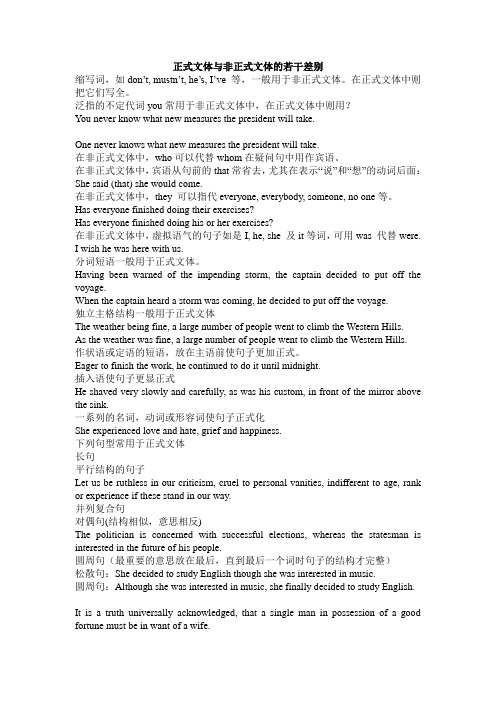
正式文体与非正式文体的若干差别缩写词,如don’t, mustn’t, he’s, I’ve 等,一般用于非正式文体。
在正式文体中则把它们写全。
泛指的不定代词you常用于非正式文体中,在正式文体中则用?You never know what new measures the president will take.One never knows what new measures the president will take.在非正式文体中,who可以代替whom在疑问句中用作宾语。
在非正式文体中,宾语从句前的that常省去,尤其在表示“说”和“想”的动词后面:She said (that) she would come.在非正式文体中,they 可以指代everyone, everybody, someone, no one等。
Has everyone finished doing their exercises?Has everyone finished doing his or her exercises?在非正式文体中,虚拟语气的句子如是I, he, she 及it等词,可用was 代替were.I wish he was here with us.分词短语一般用于正式文体。
Having been warned of the impending storm, the captain decided to put off the voyage.When the captain heard a storm was coming, he decided to put off the voyage.独立主格结构一般用于正式文体The weather being fine, a large number of people went to climb the Western Hills.As the weather was fine, a large number of people went to climb the Western Hills.作状语或定语的短语,放在主语前使句子更加正式。
论英文写作中正式文体与非正式文体的区别
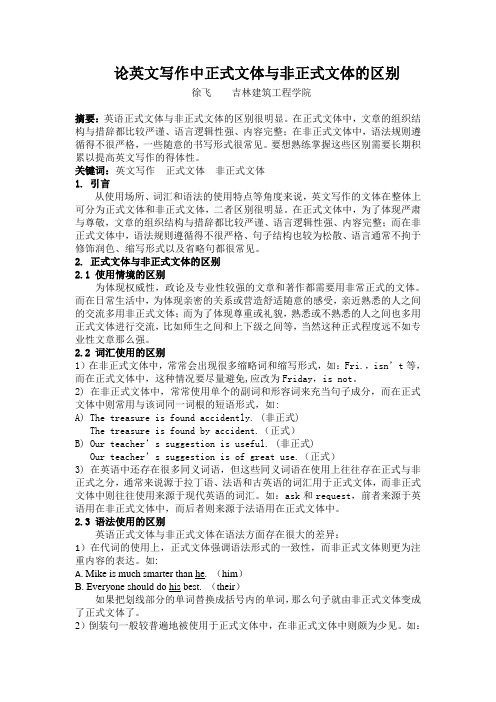
论英文写作中正式文体与非正式文体的区别徐飞吉林建筑工程学院摘要:英语正式文体与非正式文体的区别很明显。
在正式文体中,文章的组织结构与措辞都比较严谨、语言逻辑性强、内容完整;在非正式文体中,语法规则遵循得不很严格,一些随意的书写形式很常见。
要想熟练掌握这些区别需要长期积累以提高英文写作的得体性。
关键词:英文写作正式文体非正式文体1. 引言从使用场所、词汇和语法的使用特点等角度来说,英文写作的文体在整体上可分为正式文体和非正式文体,二者区别很明显。
在正式文体中,为了体现严肃与尊敬,文章的组织结构与措辞都比较严谨、语言逻辑性强、内容完整;而在非正式文体中,语法规则遵循得不很严格、句子结构也较为松散、语言通常不拘于修饰润色、缩写形式以及省略句都很常见。
2. 正式文体与非正式文体的区别2.1 使用情境的区别为体现权威性,政论及专业性较强的文章和著作都需要用非常正式的文体。
而在日常生活中,为体现亲密的关系或营造舒适随意的感受,亲近熟悉的人之间的交流多用非正式文体;而为了体现尊重或礼貌,熟悉或不熟悉的人之间也多用正式文体进行交流,比如师生之间和上下级之间等,当然这种正式程度远不如专业性文章那么强。
2.2 词汇使用的区别1)在非正式文体中,常常会出现很多缩略词和缩写形式,如:Fri.,isn’t等,而在正式文体中,这种情况要尽量避免,应改为Friday,is not。
2) 在非正式文体中,常常使用单个的副词和形容词来充当句子成分,而在正式文体中则常用与该词同一词根的短语形式,如:A) The treasure is found accidently. (非正式)The treasure is found by accident.(正式)B) Our teacher’s suggestion is useful. (非正式)Our teacher’s suggestion is of great use.(正式)3) 在英语中还存在很多同义词语,但这些同义词语在使用上往往存在正式与非正式之分,通常来说源于拉丁语、法语和古英语的词汇用于正式文体,而非正式文体中则往往使用来源于现代英语的词汇。
论英文写作中正式文体与非正式文体的区别

论英文写作中正式文体与非正式文体的区别徐飞吉林建筑工程学院摘要:英语正式文体与非正式文体的区别很明显。
在正式文体中,文章的组织结构与措辞都比较严谨、语言逻辑性强、内容完整;在非正式文体中,语法规则遵循得不很严格,一些随意的书写形式很常见。
要想熟练掌握这些区别需要长期积累以提高英文写作的得体性。
关键词:英文写作正式文体非正式文体1. 引言从使用场所、词汇和语法的使用特点等角度来说,英文写作的文体在整体上可分为正式文体和非正式文体,二者区别很明显。
在正式文体中,为了体现严肃与尊敬,文章的组织结构与措辞都比较严谨、语言逻辑性强、内容完整;而在非正式文体中,语法规则遵循得不很严格、句子结构也较为松散、语言通常不拘于修饰润色、缩写形式以及省略句都很常见。
2. 正式文体与非正式文体的区别2.1 使用情境的区别为体现权威性,政论及专业性较强的文章和著作都需要用非常正式的文体。
而在日常生活中,为体现亲密的关系或营造舒适随意的感受,亲近熟悉的人之间的交流多用非正式文体;而为了体现尊重或礼貌,熟悉或不熟悉的人之间也多用正式文体进行交流,比如师生之间和上下级之间等,当然这种正式程度远不如专业性文章那么强。
2.2 词汇使用的区别1)在非正式文体中,常常会出现很多缩略词和缩写形式,如:Fri.,isn’t等,而在正式文体中,这种情况要尽量避免,应改为Friday,is not。
2) 在非正式文体中,常常使用单个的副词和形容词来充当句子成分,而在正式文体中则常用与该词同一词根的短语形式,如:A) The treasure is found accidently. (非正式)The treasure is found by accident.(正式)B) Our teacher’s suggestion is useful. (非正式)Our teacher’s suggestion is of great use.(正式)3) 在英语中还存在很多同义词语,但这些同义词语在使用上往往存在正式与非正式之分,通常来说源于拉丁语、法语和古英语的词汇用于正式文体,而非正式文体中则往往使用来源于现代英语的词汇。
雅思考试--如何运用正式用语与非正式用语
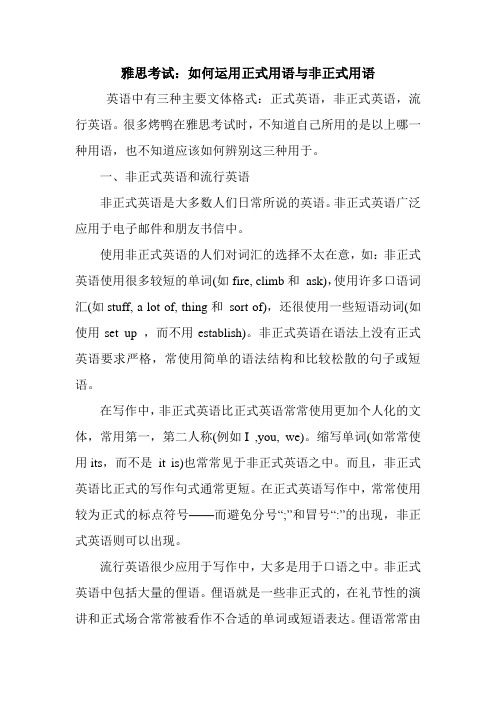
雅思考试:如何运用正式用语与非正式用语英语中有三种主要文体格式:正式英语,非正式英语,流行英语。
很多烤鸭在雅思考试时,不知道自己所用的是以上哪一种用语,也不知道应该如何辨别这三种用于。
一、非正式英语和流行英语非正式英语是大多数人们日常所说的英语。
非正式英语广泛应用于电子邮件和朋友书信中。
使用非正式英语的人们对词汇的选择不太在意,如:非正式英语使用很多较短的单词(如fire, climb和ask),使用许多口语词汇(如stuff, a lot of, thing和sort of),还很使用一些短语动词(如使用set up ,而不用establish)。
非正式英语在语法上没有正式英语要求严格,常使用简单的语法结构和比较松散的句子或短语。
在写作中,非正式英语比正式英语常常使用更加个人化的文体,常用第一,第二人称(例如I ,you, we)。
缩写单词(如常常使用its,而不是it is)也常常见于非正式英语之中。
而且,非正式英语比正式的写作句式通常更短。
在正式英语写作中,常常使用较为正式的标点符号——而避免分号“;”和冒号“:”的出现,非正式英语则可以出现。
流行英语很少应用于写作中,大多是用于口语之中。
非正式英语中包括大量的俚语。
俚语就是一些非正式的,在礼节性的演讲和正式场合常常被看作不合适的单词或短语表达。
俚语常常由固定的社会团体或职业人群使用。
二、正式英语主要应用于写作中。
这种文体格式通常带有学术性的写作口吻,通常见于学术课本,大学论文,商业信函和合同中。
在口语表达方面,正式英语通常只用于官方或正式场合,例如,在大学毕业典礼上正式欢迎来宾。
正式英语比日常用语使用更多的复杂词汇。
例如,正式用语常常比日常对话使用“更庞大”的词汇。
如以下几个多音节词compensate, ascend 和interrogate. 正式用语还常常使用单个动词(如establish)来代替简单的短语动词(如set up)。
此外,在正式用语中还要尽量避免俚语和口语的出现。
最新英语正式文体与非正式文体的区别
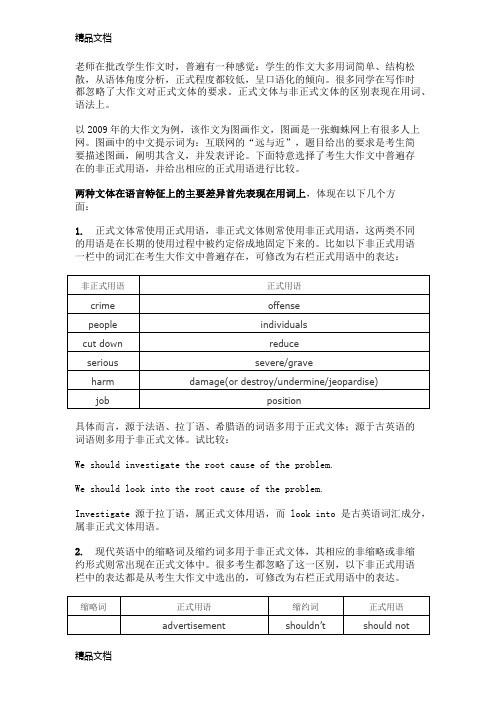
老师在批改学生作文时,普遍有一种感觉:学生的作文大多用词简单、结构松散,从语体角度分析,正式程度都较低,呈口语化的倾向。
很多同学在写作时都忽略了大作文对正式文体的要求。
正式文体与非正式文体的区别表现在用词、语法上。
以2009年的大作文为例,该作文为图画作文,图画是一张蜘蛛网上有很多人上网。
图画中的中文提示词为:互联网的“远与近”,题目给出的要求是考生简要描述图画,阐明其含义,并发表评论。
下面特意选择了考生大作文中普遍存在的非正式用语,并给出相应的正式用语进行比较。
两种文体在语言特征上的主要差异首先表现在用词上,体现在以下几个方面:1.正式文体常使用正式用语,非正式文体则常使用非正式用语,这两类不同的用语是在长期的使用过程中被约定俗成地固定下来的。
比如以下非正式用语一栏中的词汇在考生大作文中普遍存在,可修改为右栏正式用语中的表达:具体而言,源于法语、拉丁语、希腊语的词语多用于正式文体;源于古英语的词语则多用于非正式文体。
试比较:We should investigate the root cause of the problem.We should look into the root cause of the problem.Investigate源于拉丁语,属正式文体用语,而look into是古英语词汇成分,属非正式文体用语。
2. 现代英语中的缩略词及缩约词多用于非正式文体,其相应的非缩略或非缩约形式则常出现在正式文体中。
很多考生都忽略了这一区别,以下非正式用语栏中的表达都是从考生大作文中选出的,可修改为右栏正式用语中的表达。
Informl: People can’t put up with the alienation brought by the Internet.3. 很多考生使用了很多短语动词,而这正是非正式文体的一大特征,正式文体则常用与之同义的单个动词。
试比较:Formal: Individuals cannot tolerate the alienation brought by the Internet.Informal: In this day and age, many people can make use of theInternet via computers or mobile phones.Formal: In this day and age, many individuals can utilise theInternet via computers or mobile phones.两种文体在语言特征上的第二类主要差异体现在语法上,具体包括以下几个方面:1.在构成比较句型时,很多考生选择使用了人称代词的宾格形式,其实使用人称代词的主格形式要显得更正式些。
浅谈英语中的“正式英语”与“非正式英语”

浅谈正式英语与非正式英语有何不同文章来源:乐知英语小站。
喜欢我们的文章,就来我们的英语小站看吧,有大量精选的英语干货以及各种欧美趣谈,资料每天都有更新。
想学英语,也可以听外教老师讲课哟。
听课地址:/sessionhall.html?uid=sophie在开始主题之前,我们先以日常衣着来体会一下:你会穿成下面左图那样去job interview(面试)吗?你会穿成下面右图那样去海滩玩吗?同理,英语也分场合有正式和非正式之分。
正式英语(formal English)是比较严谨、庄重的语体。
其特点是在词汇、句子、语音方面都必须严格遵守民族标准语言的规范。
它所表达的是作者与读者直接的一种非个人的关系,它力求不借助其它非语言表达方式如面部表情、手势等来准确地表达思想。
而反过来说,非正式英语(informal English),又称口头英语(spoken English)或日常交谈语体。
其特点是多少有些脱离标准语言规范,用词比较自由,句型结构比较简单。
它体现出说话者和听者之间试图建立一种随和的、轻松的、亲密的关系。
在什么场合选择哪种正式程度的语言表达是一个十分重要的问题。
有的情况下,用太过正式或太过不正式的语言都会给别人留下不好的印象(bad impression)。
那么,正式与非正式英语用法是怎样的呢?1.复杂的单词(complicated vocabulary)vs 简短的单词(short words)比如说,fatigued(疲惫的)vs tired(疲惫的)、explode(爆炸)vs blow up(爆炸)、reduce(减少)vs cut down(减少)等等。
2.复杂长句(long and complicated sentences)vs 简单短句(simple sentences)比方说,“虽然当前经济十分强盛,但一些专家预言经济衰退即将来临”正式:The economy is currently quite robust; nevertheless, some specialists predict an imminent recession.非正式:The economy is very strong right now, but some specialists say we’ll have a recession soon.3.回避短语动词(phrasal verbs)vs 大量使用短语动词、俚语、习语以及聊天语言(phrasalverbs,slang、idioms and text speaking)我们经常会发现,明明课本学得还不错,但是就是听不懂电影和电视剧里的英文,这是为什么呢?因为电影和电视剧里经常出现大量的俚语和习语,即便单词量过关,能够完全听懂还是有点困难,毕竟我们在书本里是不会学到这些。
正式英语与非正式英语
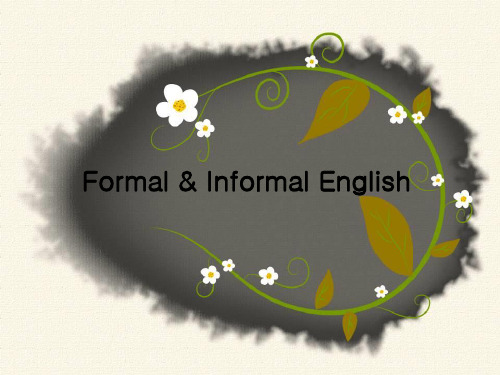
从句比不定式的形式正式 It is important that we should do it (for us to do it). It seems that he is a teacher. (He seems to be a teacher.)
III. 指示代词
1) 当`This' 和 `that'都是后指时,'that' 比 `this' 正式。 That (This) is what I thought.
2.)`that / those' 作为先行词比名词正式。 Those flowers are better than those which (the flowers) we planted last year.
2)方式和程度状语可用介词短语,也可以用副词表示,一般说,介 词短语比副词正式。
He spoke in a confident way / with confidence. (confide ntly)
句子结构
3) 英语中用一些副词有两种形式,一种是-ly形式,一种是同形容
词的形式,一般说,前者比后者正式。
eg. As we (I) showed in Chapter One, it is not an easy question
. One (You) never knows what may happen.
6) 在复合句中,主句和从句中的 d.
主语出现名词和代词时,主句中 d.)
The plane took off as soon as it had refuele (It took off as soon as the plane had refuele
商务英语写作正式和非正式文体差异
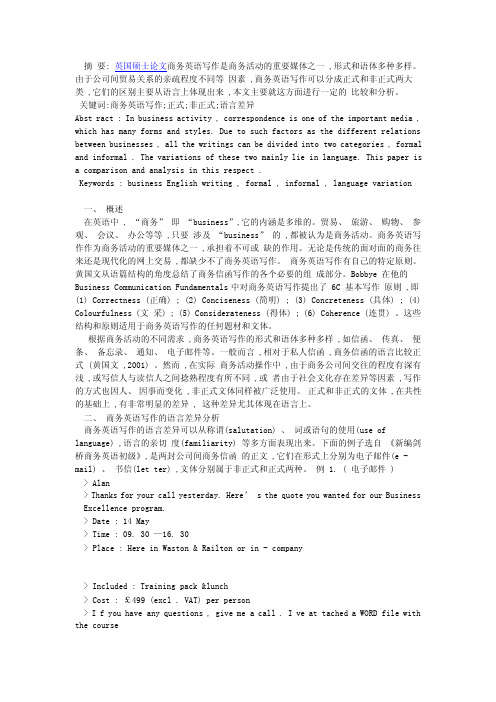
摘要: 英国硕士论文商务英语写作是商务活动的重要媒体之一 ,形式和语体多种多样。
由于公司间贸易关系的亲疏程度不同等因素 ,商务英语写作可以分成正式和非正式两大类 ,它们的区别主要从语言上体现出来 ,本文主要就这方面进行一定的比较和分析。
关键词:商务英语写作;正式;非正式;语言差异Abst ract : In business activity , correspondence is one of the important media , which has many forms and styles. Due to such factors as the different relations between businesses , all the writings can be divided into two categories , formal and informal . The variations of these two mainly lie in language. This paper is a comparison and analysis in this respect .Keywords : business English writing , formal , informal , language variation一、概述在英语中 , “商务”即“business”,它的内涵是多维的。
贸易、旅游、购物、参观、会议、办公等等 ,只要涉及“business”的 ,都被认为是商务活动。
商务英语写作作为商务活动的重要媒体之一 ,承担着不可或缺的作用。
无论是传统的面对面的商务往来还是现代化的网上交易 ,都缺少不了商务英语写作。
商务英语写作有自己的特定原则。
黄国文从语篇结构的角度总结了商务信函写作的各个必要的组成部分。
Bobbye 在他的Business Communication Fundamentals中对商务英语写作提出了 6C 基本写作原则 ,即(1) Correctness (正确) ; (2) Conciseness (简明) ; (3) Concreteness (具体) ; (4) Colourfulness (文采) ; (5) Considerateness (得体) ; (6) Coherence (连贯) 。
正式和非正式文体 Formal and Informal Styles

Special features like these in language are a matter of style. The word style has several senses: it may refer to a writer's habitual or peculiar way of using language, or the prevalent features of the language of a certain period, or the characteristic aspects of the language of a certain type of writing. It may also mean grace or elegance in writing, as in "He has no style."
However, there are also differences between different types of writing. In a personal letter, for instance, sentences are usually short and simple, even incomplete, and most words are those used in daily conversation, easy and even slangy. In a legal document, on the other hand, most sentences are long and involved, and many, if not most, of the words are polysyllabic, with special terms difficult for ordinary people to understand.
正式英语和非正式英语区别
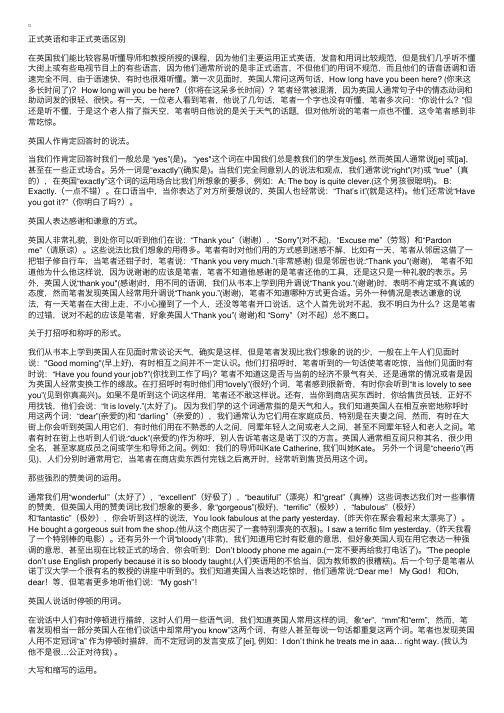
正式英语和⾮正式英语区别在英国我们能⽐较容易听懂导师和教授所授的课程,因为他们主要运⽤正式英语,发⾳和⽤词⽐较规范,但是我们⼏乎听不懂⼤街上或有些电视节⽬上的有些语⾔,因为他们通常所说的是⾮正式语⾔,不但他们的⽤词不规范,⽽且他们的语⾳语调和语速完全不同,由于语速快,有时也很难听懂。
第⼀次见⾯时,英国⼈常问这两句话,How long have you been here? (你来这多长时间了)? How long will you be here?(你将在这呆多长时间)?笔者经常被混淆,因为英国⼈通常句⼦中的情态动词和助动词发的很轻、很快。
有⼀天,⼀位⽼⼈看到笔者,他说了⼏句话,笔者⼀个字也没有听懂,笔者多次问:“你说什么?”但还是听不懂,于是这个⽼⼈指了指天空,笔者明⽩他说的是关于天⽓的话题,但对他所说的笔者⼀点也不懂,这令笔者感到⾮常吃惊。
英国⼈作肯定回答时的说法。
当我们作肯定回答时我们⼀般总是 “yes”(是)。
“yes"这个词在中国我们总是教我们的学⽣发[jes], 然⽽英国⼈通常说[je] 或[ja],甚⾄在⼀些正式场合。
另外⼀词是“exactly”(确实是)。
当我们完全同意别⼈的说法和观点,我们通常说“right”(对)或 “true”(真的),在英国“exactly”这个词的运⽤场合⽐我们所想象的要多,例如:A: The boy is quite clever.(这个男孩很聪明)。
B: Exactly.(⼀点不错)。
在⼝语当中,当你表达了对⽅所要想说的,英国⼈也经常说:“That’s it”(就是这样)。
他们还常说“Have you got it?”(你明⽩了吗?)。
英国⼈表达感谢和谦意的⽅式。
英国⼈⾮常礼貌,到处你可以听到他们在说:“Thank you”(谢谢),“Sorry”(对不起),“Excuse me”(劳驾)和“Pardon me”(请原谅)。
这些说法⽐我们想象的⽤得多。
正式语言与非正式语言
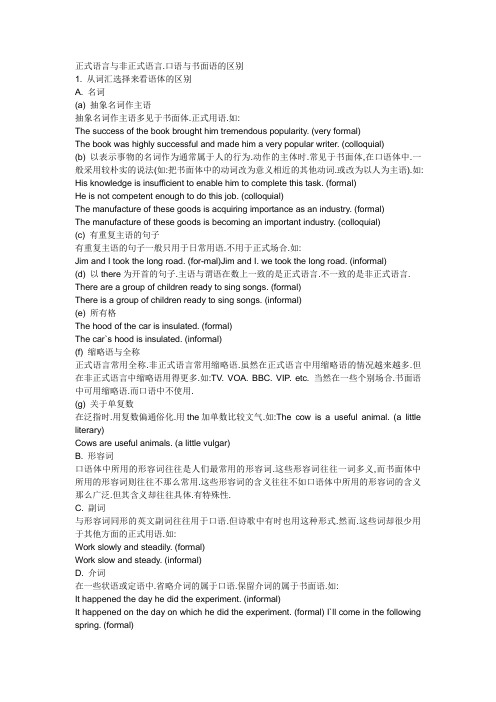
正式语言与非正式语言.口语与书面语的区别1. 从词汇选择来看语体的区别A. 名词(a) 抽象名词作主语抽象名词作主语多见于书面体.正式用语.如:The success of the book brought him tremendous popularity. (very formal)The book was highly successful and made him a very popular writer. (colloquial)(b) 以表示事物的名词作为通常属于人的行为.动作的主体时.常见于书面体,在口语体中.一般采用较朴实的说法(如:把书面体中的动词改为意义相近的其他动词.或改为以人为主语).如: His knowledge is insufficient to enable him to complete this task. (formal)He is not competent enough to do this job. (colloquial)The manufacture of these goods is acquiring importance as an industry. (formal)The manufacture of these goods is becoming an important industry. (colloquial)(c) 有重复主语的句子有重复主语的句子一般只用于日常用语.不用于正式场合.如:Jim and I took the long road. (for-mal)Jim and I. we took the long road. (informal)(d) 以there为开首的句子.主语与谓语在数上一致的是正式语言.不一致的是非正式语言. There are a group of children ready to sing songs. (formal)There is a group of children ready to sing songs. (informal)(e) 所有格The hood of the car is insulated. (formal)The car`s hood is insulated. (informal)(f) 缩略语与全称正式语言常用全称.非正式语言常用缩略语.虽然在正式语言中用缩略语的情况越来越多.但在非正式语言中缩略语用得更多.如:TV. VOA. BBC. VIP. etc. 当然在一些个别场合.书面语中可用缩略语.而口语中不使用.(g) 关于单复数在泛指时.用复数偏通俗化.用the加单数比较文气.如:The cow is a useful animal. (a little literary)Cows are useful animals. (a little vulgar)B. 形容词口语体中所用的形容词往往是人们最常用的形容词.这些形容词往往一词多义,而书面体中所用的形容词则往往不那么常用.这些形容词的含义往往不如口语体中所用的形容词的含义那么广泛.但其含义却往往具体.有特殊性.C. 副词与形容词同形的英文副词往往用于口语.但诗歌中有时也用这种形式.然而.这些词却很少用于其他方面的正式用语.如:Work slowly and steadily. (formal)Work slow and steady. (informal)D. 介词在一些状语或定语中.省略介词的属于口语.保留介词的属于书面语.如:It happened the day he did the experiment. (informal)It happened on the day on which he did the experiment. (formal) I`ll come in the following spring. (formal)I`ll come the following spring. (colloquialE. 代词(a) 口语中多省略作主语的代词.如:Haven`t seen you for ages! (informal)(b) 关于mine. his. yours. Ours当mine. his. yours. ours等物主代词作宾语或表语时.可用于书面语.也可用于口语.但如果这种物主代词(或名词所有格)作主语放在句首.并暗指表语名词所用的概念.那就是一种比较文雅的说法了.如:His (or Mr. Li`s) is a noble character.在日常口语中一般这么用:His (or Mr. Li`s) character is a noble one. / He has a noble character.但下面这类句子对书面语和口语都适用:Your teacher and mine are talking in the room.(c) we. I在一些正式场合.作者或演讲人为了表示谦虚.往往避免用I.而用we代替.如:As we showed a moment ago ... (formal)As I said a moment ago ... (not so formal)(d) you. we用we代替you是一种表示客气的语言.如:Don`t worry about your shoes! (imperative)Why don`t we not worry about your shoes. OK ? (polite)(e) you. one在翻译中文"任何人"."谁都"等时.译成one为formal language.译成you为informal language.如:One must love one`s country. (formal)You must love your country. (informal)(f) 关于I. me. he. him. etc.He says she saw you and me. (formal)He says she saw you and I. (informal)F. 动名词在书面语中.一般用物主代词或名词所有格来修饰动名词短语.以表示行为者.如:Mr. Li dislikes Zhang Hui`s coming home late.There will be little chance of my visiting the place again.Li Wen`s falling ill suddenly gave me a surprise.口语中一般以代词的宾格或名词普通格加分词.for加宾语加不定式.从句.独立句等方式表达.如:Mr. Li dislikes Zhang Hui coming home late.There will be little chance for me to visit the place again.Li Wen fell ill suddenly. This gave me a surprise.G. 关于缩写用缩写形式多为非正式语言.而用非缩写形式多为正式语言.如:do not. we are. I am. I have. there is. cannot. will not等多见于正式语言.而don`t. we`re. I`m. I`ve. there`s. can`t. won`t 多见于非正式语言.exam. bike等多用于口语.examination. bicycle等多用于书面语.oh. dear. why. well等是口语中常见的感叹词.2. 从句法来看语体的区别A. 修饰语在书面文字中.修饰语可以与中心词相隔较远.修饰语也可以较长.而在口语中则相反.如: There exist complex computations in science and engineering which people are unable to make. (written)There are complex computations in science and engineering. and people are unable to make those computations. (colloquial)B. 句子的长短一般来说.书面语句子较长.口语句子较短.(a) 议论文.商业或法律公文等书面语不仅常用较长的修饰语.而且有时用较长的插入语.甚至插入语中还有插入语.但在一般的口语中则不用较长的插入语.常用的较短插入语有:of course. for example. I believe. I think. you see. you know. to be frank. etc.(b) 在书面语中.一个句子有时有好几个关系代词,而口语中关系代词则用的极少.往往被分成几个简单句.如:These needles. which were made of fish-shaped pieces of iron that floated on water. were acted on by the earth`s magnetic field. (formal)These needles were made of fish-shaped pieces of iron that floated on water. They were acted on by the earth`s magnetic field. (informal)C. 关于时态在现在的口语中.有时用过去时代替现在完成时.如:-Is anybody using this chair?-No. I saved it for you.在口语中常用现在时代替将来时.如:She is coming tomorrow.在口语中有时用一般现在时说明一个已经发生了的动作.如:He says it is very important.D. 虚拟语气(a)不够熟悉的人之间对话.或在正式场合演讲.对话时.一般用虚拟语气来陈述自己的看法.提出请求或邀请.提出建议或劝告.提出问题.如:If Mr. Wang was here now. he would tell you about it. (informal)If Mr. Wang were here now. he would tell you about it. (formal)(b) 有一些表示主观愿望和情绪的形容词.如desirous等要求后面的状语从句的谓语动词用虚拟语气.这种结构主要用于书面语中.口语中往往用不定式来代替这种从句.如:He was anxious that we should stay for dinner. (formal)He was anxious to have us stay for dinner. (informal)E. 语序在书面语中.为了使句子平衡对称.或为了表示强调.常把状语.表语.宾语等成分放在句首.并将主谓次序颠倒过来,而口语体则一般用自然语序.F. 关于省略(a) 在正式文字或正式场合的对话中.一般要用完整的句子.在口语中用省略句较多.主要是为了节省时间.使对话自然.生动.简洁.有力.如:Where to go now? Why not do it this way?(b) 在正式语言中.所省略的部分一般都是前边出现过的.如:He had finished the work and gone home.(c) 关系代词在限定性定语从句中做谓语动词宾语或介词宾语时.在口语中一般省去.如: The girl you spoke to just now is my sister.(d) 宾语从句前的that在口语中往往省去.表语后面的从句之前的that在口语中也常省去.如: He said he would go to London.I`m afraid he is right.G. 主谓语的一致性在有些情况下.非正式语言中常按意思决定动词的单复数.所以主语和谓语在数上可能不一致.如:Neither he nor his wife have arrived. (informal)Neither he nor his wife has arrived. (formal)(David Park designs & teaches IELTS courses for individuals & groups. He was contracted by the British Council to provide this article.)A student preparing for IELTS (International English Language Testing System) sent me this query: “I don’t know if ‘spark off’ is a f ormal word or not. How can I tell the difference between formal and informal words?” Here’s what I said to her in my reply:English has three main styles: formal, informal and popular.Formal EnglishFormal English is mainly used in writing. This style is academic in tone and is commonly used in academic textbooks, most university essays, business letters and contracts.In the case of speaking, formal English is usually only used for official or serious occasions, e.g., to formally welcome guests at a university graduation ceremony.Formal English uses more complex vocabulary than everyday speech. For example, it uses many “bigger” words that aren’t normally used in conversation. Examples are multi-syllable words like compensate, ascend and interrogate. It also prefers one-part verbs (e.g., establish) instead of simpler, phrasal verbs (e.g., set up). Slang and colloquial vocabulary are avoided.When formal English is used in writing, sentences tend to be long and complex, and grammar rules are followed strictly. It tends to be impersonal (or neutral), often using impersonal pronouns like it and passive verbs. Contracted and abbreviated forms of words are usually avoided.Informal & popular EnglishInformal English is the language spoken by most people every day. It’s also widely used in emails and letters to friends.Speakers of informal English aren’t very concerned about their vocabulary. For example, informal English uses many short words (e.g., fire, climb and ask), much colloquial vocabulary (e.g., stuff, a lot of, thing and sort of) and multi-part verbs (e.g., set up instead of establish). Informal English is also more relaxed about grammar rules than formal English, using simpler grammatical structures and loosely-connected sentences and phrases.When used in writing, informal English uses first and second person points-of-view (e.g., I, you and we) to create a more personal style than formal English. Contractions (e.g., it’s instead of it is)are also very common. As well, informal English tends to use shorter sentences than in more formal writing, and the more formal punctuation marks − the semi-colon (;) and colon (:) − are usually avoided.Popular English is rarely used in writing, being used mostly in spoken English. It includes a good bit of slang. Slang is words or expressions that are very informal and are not considered suitable for polite speech or more formal situations. Slang is often used only by particular social groups or professions.More on phrasal verbsWhen people speak or write informally, they often use phrasal verbs (also called multi-word or multi-part verbs). Here are some examples. The formal, one-word verb with the same meaning is in brackets.Phrasal verbs & single-word equivalentsask for (request) go down with (contract)set up (establish) deal with (handle)find out (discover) take in (deceive)Phrasal verbs are very common in spoken English. However, they’re usually less formal than their one-word verb equivalents.In formal writing, writers often prefer to use single-word verbs, such as examine or devise, rather than phrasal verbs, such as look at or come up with. Compare the pairs of verbs in the next table.Though there’s a tendency to use fewer phrasal verbs in formal language, it’s not wrong to use them. Nevertheless, if there’s a one-word verb that’s more formal, then use it.Don’t think that a few phrasal verbs in your IELTS writing will make it too informal. In fact, there are many situations - even in quite formal texts - when a phrasal verb is the most natural-sounding way of expressing an idea. For instance, put on is much more natural than the formal, single-word equivalent don.InformalMore formalHe checked up on his accountant. He investigated his accountant.They put up with their neighbours. They tolerated their neighbours.She caught on very quickly. She understood very quickly.She made up for it with an early night. She compensated for it with an early night.He went down with a fever. He contracted a fever.The cost of living went up. The cost of living increased/rose.Telling the differenceIt’s usually easy to decide if a word is informal or formal. Informal words are those common, ordinary and familiar words that people use every day, whereas formal words tend to be the more “serious” and less frequently used words. Often, formal words are longer than informal words. Single-word verbs are also usually more formal than their phrasal verb equivalents.For instance, saying something is en ormous is formal, but saying it’s whopping is informal. Phrases like on the one hand or as indicated above are formal, but phrases like by the way or that reminds me are informal. Note that some informal words are more formal than other informal words. The informal verb understand, for example, is more formal than the informal verb get. However, both are less formal than the formal verb comprehend.IELTS uses a semi-formal styleThe IELTS website says academic essays may use “a neutral or slightly formal style of writing.”This means your IELTS academic writing may use slightly less formal vocabulary (e.g., phrasal verbs like spark off instead of cause) as well as words that are more formal. It may also use the complex grammar of formal English, or it may use slightly simpler grammatical structures.However, the more formal the vocabulary and the more complex the grammar is, the higher the IELTS score. In the case of vocabulary, for instance, the scoring scheme gives higher scores when “less common” or“uncommon lexical items” (words or phrases) are used − which is what formal vocabulary is. Click here to see the scoring scheme.Here’s my advice for vocabulary for academic essays in the IELTS exam:Use a more formal one-word verb if it sounds more appropriate than its phrasal verb equivalent. Avoid using a personal or conversational style (as if you’re talking to the examiner). Therefore, try not to use words like I, me, my, you, we, us and our. Though these words are widely used in informal writing and in spoken English, they’re generally thought to be too personal and too casual for formal, academic writing.If you wish, you may use the pronoun I to introduce your opinions. However, I recommend that you limit its use to the introduction and the cl osing paragraph. That way, you’ll avoid the risk of making your essay sound too conversational or overly personal.Avoid words or phrases used mainly in normal conversation as they’re usually not suitable for usein academic writing. Dictionaries often i dentify these words with the label “informal.” In your essay, use a more formal equivalent. Here are some examples:Avoid Usekids childrenOK all right; acceptablea lot of much; manyheaps many; a great dealNever use colloquial English or slang. Colloquial English is a type of informal English, and it includes words such as gonna or wanna, and phrases such as ain’t nothin’ and dead as a doornail. Dictionaries usually mark colloquial words and phrases with a label like “colloq.” Because colloqu ial English and slang are usually spoken rather than written, they’ll make your academic writing sound too conversational and so less credible.Although it’s usual to contract words in spoken and informal written English (e.g., can’t, won’t, shouldn’t and hasn’t), it’s better to avoid using any contractions in your academic essay.Avoid abbreviating words in academic writing. Don’t say yrs, e.g. (which stands for the original Latin exempli gratia and means “for example”) or i.e. (which stands for the orig inal Latin id est and means “that is”). Instead, write the words in full using their English equivalents (years, for example and that is).Glossaryslang (noun) - informal language that is usually spoken and used especially by certain groups of peoplecolloquial (adjective) - words or expressions that are informal and more suitable for use in speechcontract (verb) - to shorten somethingtendency (noun) - a likelihood to do somethingDiscussionWhat are the three main styles of English? Which style should you use for your IELTS academic writing? Why?Apart from using many short words in informal English, what other differences can you point out between informal and formal English?Have you checked the scoring scheme for the writing test? How will you evaulate your own writing in the areas of lexical resource and grammatical range and accuracy?After reading this article, can you compile a list of words or phrases that should not be used whenwriting your IELTS academic essay?DownloadsPlease right click on the title and select 'Save Target As...' from the menu to save the file to your computer.。
英语中的语体
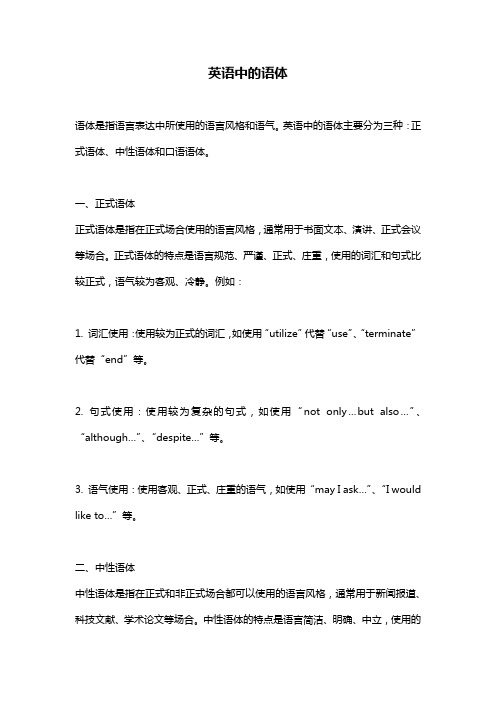
英语中的语体语体是指语言表达中所使用的语言风格和语气。
英语中的语体主要分为三种:正式语体、中性语体和口语语体。
一、正式语体正式语体是指在正式场合使用的语言风格,通常用于书面文本、演讲、正式会议等场合。
正式语体的特点是语言规范、严谨、正式、庄重,使用的词汇和句式比较正式,语气较为客观、冷静。
例如:1. 词汇使用:使用较为正式的词汇,如使用“utilize”代替“use”、“terminate”代替“end”等。
2. 句式使用:使用较为复杂的句式,如使用“not only…but also…”、“although…”、“despite…”等。
3. 语气使用:使用客观、正式、庄重的语气,如使用“may I ask…”、“I would like to…”等。
二、中性语体中性语体是指在正式和非正式场合都可以使用的语言风格,通常用于新闻报道、科技文献、学术论文等场合。
中性语体的特点是语言简洁、明确、中立,使用的词汇和句式比较普通,语气较为客观、中立。
例如:1. 词汇使用:使用普通的词汇,如使用“use”代替“utilize”、“end”代替“terminate”等。
2. 句式使用:使用简单明了的句式,如使用“and”、“but”、“because”等。
3. 语气使用:使用客观、中立的语气,如使用“according to…”、“it is believed that…”等。
三、口语语体口语语体是指在非正式场合使用的语言风格,通常用于日常交流、社交场合、非正式会议等场合。
口语语体的特点是语言随意、自由、轻松,使用的词汇和句式比较口语化,语气较为亲切、自然。
例如:1. 词汇使用:使用口语化的词汇,如使用“use”代替“utilize”、“end”代替“terminate”等。
2. 句式使用:使用简单明了的句式,如使用“and”、“but”、“because”等。
3. 语气使用:使用亲切、自然的语气,如使用“hey”、“what’s up”等。
试谈正式英语和非正式英语在词汇-语法上的特点
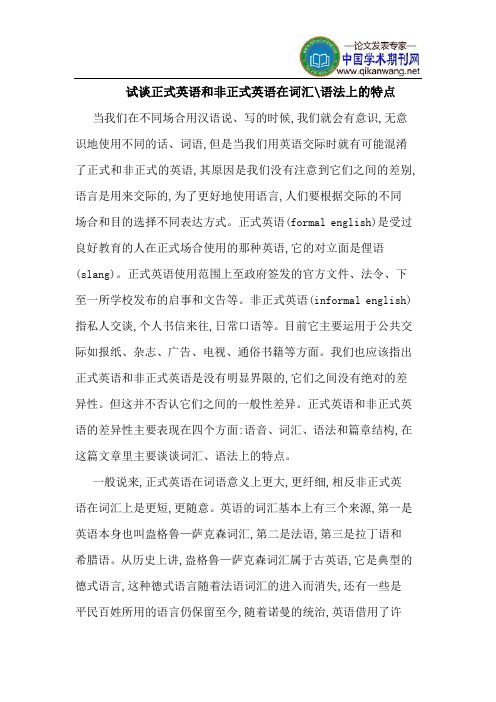
试谈正式英语和非正式英语在词汇\语法上的特点当我们在不同场合用汉语说、写的时候,我们就会有意识,无意识地使用不同的话、词语,但是当我们用英语交际时就有可能混淆了正式和非正式的英语,其原因是我们没有注意到它们之间的差别,语言是用来交际的,为了更好地使用语言,人们要根据交际的不同场合和目的选择不同表达方式。
正式英语(formal english)是受过良好教育的人在正式场合使用的那种英语,它的对立面是俚语(slang)。
正式英语使用范围上至政府签发的官方文件、法令、下至一所学校发布的启事和文告等。
非正式英语(informal english)指私人交谈,个人书信来往,日常口语等。
目前它主要运用于公共交际如报纸、杂志、广告、电视、通俗书籍等方面。
我们也应该指出正式英语和非正式英语是没有明显界限的,它们之间没有绝对的差异性。
但这并不否认它们之间的一般性差异。
正式英语和非正式英语的差异性主要表现在四个方面:语音、词汇、语法和篇章结构,在这篇文章里主要谈谈词汇、语法上的特点。
一般说来,正式英语在词语意义上更大,更纤细,相反非正式英语在词汇上是更短,更随意。
英语的词汇基本上有三个来源,第一是英语本身也叫盎格鲁—萨克森词汇,第二是法语,第三是拉丁语和希腊语。
从历史上讲,盎格鲁—萨克森词汇属于古英语,它是典型的德式语言,这种德式语言随着法语词汇的进入而消失,还有一些是平民百姓所用的语言仍保留至今,随着诺曼的统治,英语借用了许多法语单词,这些词汇主要使用在宫庭,它们是关于骑士、政府、道德、文学等方面的内容。
在文艺复兴时期英国作家、学者借用了很多拉丁、希腊和意大利词汇,诸如“formula”,“geometry”,“philosophy”“tragedy”等,这些词汇通常运用在文化和学术界。
一般而言,盎格鲁—萨克森词汇是短小而简单的,使用在非正式场合。
法语词汇表达了一种严肃感,而希腊词汇则是使用在文学和学术界。
因此法语和希腊词汇是被使用在正式场合。
雅思写作:如何分清正式与非正式英语
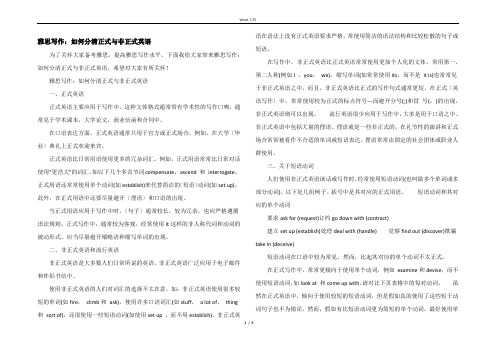
雅思写作:如何分清正式与非正式英语为了关怀大家备考雅思,提高雅思写作水平,下面我给大家带来雅思写作:如何分清正式与非正式英语,希望对大家有所关怀!雅思写作:如何分清正式与非正式英语一、正式英语正式英语主要应用于写作中。
这种文体格式通常带有学术性的写作口吻,通常见于学术课本,大学论文,商业信函和合同中。
在口语表达方面,正式英语通常只用于官方或正式场合,例如,在大学〔毕业〕典礼上正式欢迎来宾。
正式英语比日常用语使用更多的冗杂词汇。
例如,正式用语常常比日常对话使用“更浩大”的词汇。
如以下几个多音节词compensate,ascend 和interrogate。
正式用语还常常使用单个动词(如establish)来代替简洁的〔短语〕动词(如set up)。
此外,在正式用语中还要尽量避开〔俚语〕和口语的出现。
当正式用语应用于写作中时,〔句子〕通常较长,较为冗杂,也应严格遵循语法规则。
正式写作中,通常较为客观,经常使用it这样的非人称代词和动词的被动形式。
应当尽量避开缩略语和缩写单词的出现。
二、非正式英语和流行英语非正式英语是大多数人们日常所说的英语。
非正式英语广泛应用于电子邮件和伴侣书信中。
使用非正式英语的人们对词汇的选择不太在意,如:非正式英语使用很多较短的单词(如fire,climb和ask),使用许多口语词汇(如stuff,a lot of,thing 和sort of),还很使用一些短语动词(如使用set up ,而不用establish)。
非正式英语在语法上没有正式英语要求严格,常使用简洁的语法结构和比较松散的句子或短语。
在写作中,非正式英语比正式英语常常使用更加个人化的文体,常用第一,第二人称(例如I ,you,we)。
缩写单词(如常常使用its,而不是it is)也常常见于非正式英语之中。
而且,非正式英语比正式的写作句式通常更短。
在正式〔英语写作〕中,常常使用较为正式的标点符号---而避开分号(;)和冒号(:)的出现,非正式英语则可以出现。
英语书信的正式文体与非正式文体

对比:正式文体与Байду номын сангаас正式文体
The draft letter below is addressed to an unsuccessful candidate for the vacancy at Slim Gyms. Put a circle around any language that you think is too informal for the situation.
However, Iwouldlike totakethis opportunity tothankyou for your interest in Slim Gyms and towishyou everysuccessin your future career.
Yourssincerely,
Anyway, now is good time to say thanks for coming to Slim Gyms and we hope you find a job soon and have a good life.
Best wishes
Complete this corrected version of the draft letter using items from the box.
Dear Michael
After our chat about the job, it’s a pity but you didn’t get it this time. On the day, the other people were better. The guys thought your resume and interview were fantastic, but you hadn’t done enough for this job.
- 1、下载文档前请自行甄别文档内容的完整性,平台不提供额外的编辑、内容补充、找答案等附加服务。
- 2、"仅部分预览"的文档,不可在线预览部分如存在完整性等问题,可反馈申请退款(可完整预览的文档不适用该条件!)。
- 3、如文档侵犯您的权益,请联系客服反馈,我们会尽快为您处理(人工客服工作时间:9:00-18:30)。
老师在批改学生作文时,普遍有一种感觉:学生的作文大多用词简单、结构松散,从语体角度分析,正式程度都较低,呈口语化的倾向。
很多同学在写作时
都忽略了大作文对正式文体的要求。
正式文体与非正式文体的区别表现在用词、语法上。
以2009年的大作文为例,该作文为图画作文,图画是一张蜘蛛网上有很多人上网。
图画中的中文提示词为:互联网的“远与近”,题目给出的要求是考生简
要描述图画,阐明其含义,并发表评论。
下面特意选择了考生大作文中普遍存
在的非正式用语,并给出相应的正式用语进行比较。
两种文体在语言特征上的主要差异首先表现在用词上,体现在以下几个方面:
1.正式文体常使用正式用语,非正式文体则常使用非正式用语,这两类不同的用语是在长期的使用过程中被约定俗成地固定下来的。
比如以下非正式用语一
栏中的词汇在考生大作文中普遍存在,可修改为右栏正式用语中的表达:
具体而言,源于法语、拉丁语、希腊语的词语多用于正式文体;源于古英语的
词语则多用于非正式文体。
试比较:
We should investigate the root cause of the problem.
We should look into the root cause of the problem.
Investigate源于拉丁语,属正式文体用语,而look into是古英语词汇成分,属非正式文体用语。
2. 现代英语中的缩略词及缩约词多用于非正式文体,其相应的非缩略或非缩约形式则常出现在正式文体中。
很多考生都忽略了这一区别,以下非正式用语栏
中的表达都是从考生大作文中选出的,可修改为右栏正式用语中的表达。
Informl: People can’t put up with the alienation brought by the Internet.3. 很多考生使用了很多短语动词,而这正是非正式文体的一大特征,正式文体则常用与之同义的单个动词。
试比较:
Formal: Individuals cannot tolerate the alienation brought by the Internet.
Informal: In this day and age, many people can make use of the
Internet via computers or mobile phones.
Formal: In this day and age, many individuals can utilise the
Internet via computers or mobile phones.
两种文体在语言特征上的第二类主要差异体现在语法上,具体包括以下几个方面:
1.在构成比较句型时,很多考生选择使用了人称代词的宾格形式,其实使用人称代词的主格形式要显得更正式些。
Informal: He spent more time playing computer games than me.
Formal: He spent more time playing computer games than I.
2.在表达“让步”概念时,很多考生选择使用的but, anyway, all the same, though, although等为非正式文体常用词语表达。
正式文体则常使用yet, however, nevertheless, in spite of (despite), notwithstanding等词
语,
Informal: He tried to overcome his addiction to the Internet, but he failed.
Formal: He endeavoured to overcome his addiction to the Internet; however, it turned out to be a failure.
3.在构成“方式状语”时,很多考生偏爱使用副词,而这正是非正式文体常用的表达方式,正式文体则常用介词和与该副词同根的词构成的介词短语:
Informal: It’s very important to….
Formal: It is of great importance to….
4. 在表达“原因”、“后果”等概念时,很多考生由于水平所限,总是使用非正式文体常用的so, because或其他形式的表示原因的从句,正式文体则常用
on account of, accordingly, thus, hence, consequently, owing to (the fact that…)等词或词组,且比较经常地运用分词短语、独立主格结构等。
Informal: Since computers had proliferated, many people become addicted to the Internet.
Formal: Computers having proliferated, many people become addicted to the Internet.
5.在构成表示“目的”的状语时,很多考生使用具有非正式文体色彩的so as to;其实,用in order that引导的目的状语从句常出现于正式文体中:
Informal: We should do more outdoor activities so as to enrich our life.
Formal: We should do more outdoor activities in order that our life gets enriched.
6.很多考生不会使用由引导词it引导的句子(如it is said that…),实
际上,这一结构多见于正式文体,不用这一结构而表达同一意义的句子多见于
非正式文体:
Informal: The number of students in the classroom has been going down.
Formal: It has been noted with concern that the number of students attending class has been declining alarmingly.
7. 很多考生省略关系代词、连词、介词,这些情况多见于非正式文体。
Informal: He flunked many courses. He had been expelled from the college.
Formal: He flunked so many courses that he had been expelled from the college.
Informal: He dealt with the problem the way his classmates does.
Formal: He dealt with the problem in the way his classmates does.
Informal: We should prevent it going from bad to worse.
Formal: We should prevent it from going from bad to worse.
8.在表达“请求某人做某事时”,很多考生选择使用具有非正式文体色彩的主动语态句式,而没有使用具有正式文体色彩的被动语态句式。
Informal: Please communicate more with your friends and family.
Formal: More communication with your friends and family is needed.
9.很多考生未能正确使用某些不定代词、动名词的复合结构,不太注意句子的主谓一致,未能体现文章的正式文体风。
Informal: Everybody should look after themselves.
Formal: Everybody should look after himself.
Informal: Everyone should do their best.
Formal: Everyone should do his best.
Informal: I’m not surprised at him failing the course.Formal: I am not surprised at his failing the course.
考生应该在注意把握信息点,注意信件的种类(即正式文体和非正式文体)。
如果应用文考题是写给公司单位就要采用正式文体,如果考题是给朋友的话,就应当用非正式的普通用语考研英语阅读材料。
对于正式文体,我们可以背诵有关投诉信,询问信,请求信,道歉信,感谢信,建议信,求职信,辞职信,邀请信的一些惯用表达。
而非正式文体我们同样要注意词句方面不要写错,要准确多样。
